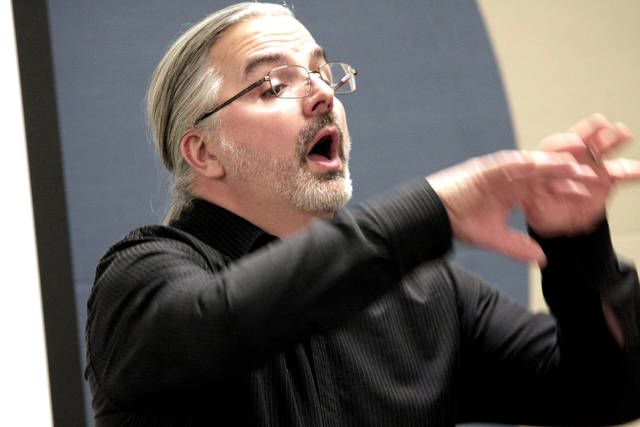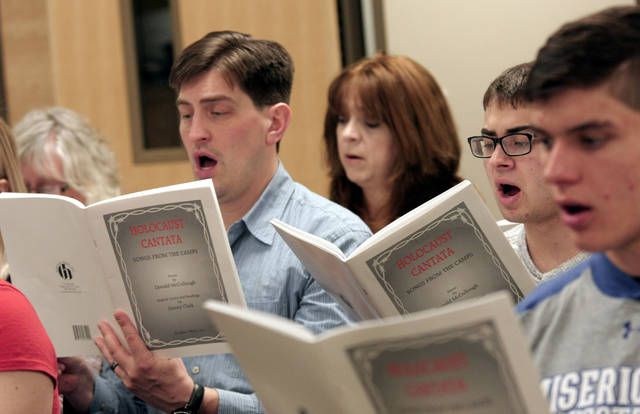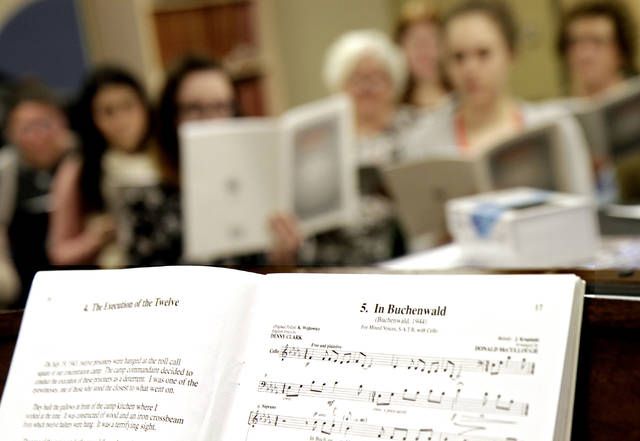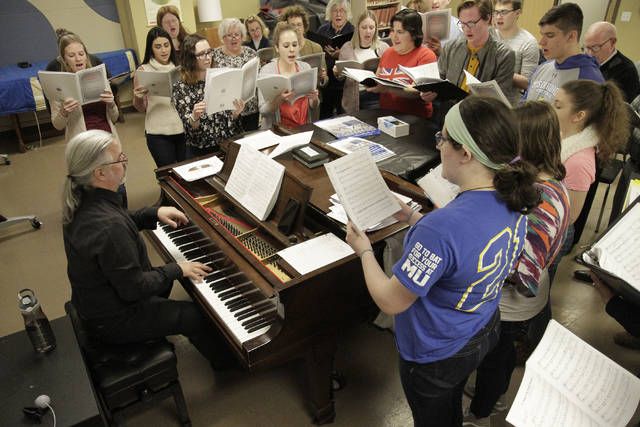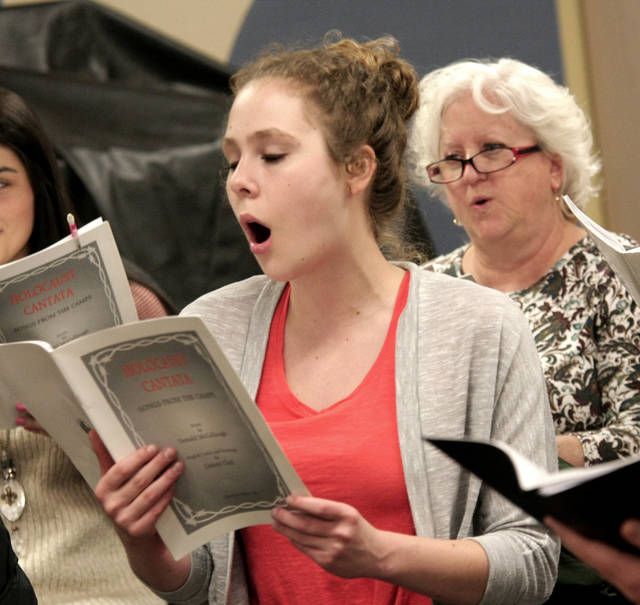Click here to subscribe today or Login.
DALLAS TWP. — The momentum of the piano sounds like wheels clattering against rails, taking a loved one to the devastation of a death camp.
The cello sounds angry and the vocals ring with despair: “Running still beside the train in fool’s futility. Farewell, my love! Remember me! Goodbye to eyes that once caressed me. Farewell to love that owned my heart. The dark hour’s on us. Our fate is sealed.”
That’s just one of the emotionally searing pieces in “Holocaust Cantata: Songs from the Camps,” a collection of music based on songs created and letters written by prisoners in Nazi concentration camps, translated by Denny Clark and arranged by Donald McCullough.
The Community Choir at Misericordia University has been preparing for an April 26 performance of the cantata for months, and while the music can be described as uplifting, singers said tears are never far away.
“If you have a heart, how can you not be moved?” said Elizabeth Stumpf, 19, a psychology major from Morristown, N.J. “My grandfather liberated one of the camps and, for me, it’s hard to talk about. But if these people, ordinary people, could endure that, I can handle ‘Oh, I did bad on my exam.’”
What the prisoners were enduring was the torture and systematic murder of 11 million people the Nazis considered undesirable, among them 6 million Jewish people as well as millions of Polish people, Roma, homosexuals and the disabled.
It’s one thing to read about cold facts, something else entirely to sing about an individual’s pain, said Karen Fry, a Dallas retiree who participates in the choir alongside Misericordia students and faculty.
“It’s always a new experience,” Fry said, “especially when you listen to some of the readings, like the one about the babies.”
That poignant reading, one of several inserted between the musical numbers, recalls six mothers giving birth at a camp and singing lullabies in different languages to the newborns as they bonded for an all-too-brief time. Soon the babies would be “needled” — given a lethal injection of poison into their hearts — and the mothers would be killed as well.
“I get overwhelmed,” choir conductor Matthew Rupcich said, predicting “I may have to take a deep breath” to compose himself during the performance. “One of the students asked what they should do if they feel overcome and I said if they need to excuse themselves or sit down on the risers, that’s OK.”
“It’s important to know the primary (sources) here were all from prisoners in Nazi concentration camps,” he added. “It shows their strength, power, resiliency and courage.”
“What are these chains and these handcuffs to us? Oh, what is this prison to us?” the Misericordia singers intone defiantly in “Song of the Polish Prisoners.” “The strength of our spirits will conquer the tortures. The suffering cannot o’erpower us.”
“It kept them going,” singer Lisa Bartorillo, a retiree from Pittston, said of the prisoners’ music. “It was all they had.”
The title of another song, “The Striped Ones,” refers to the pajamas prisoners wore as uniforms, and the women of the choir sing it a capella, in four-part harmony.
“I told them I’d like them to think of the stripes as if they were a badge of honor and strength,” Rupcich said. “They really respond to that.”
The program includes additional pieces of music the choir will sing before and after the Holocaust Cantata, Rupcich said, because simply launching into the cantata itself might be too harsh for the audience.
“I’m starting with ‘The Awakening’ by Joseph Martin, which talks about how we respond to the beauty and joy and love of music and then we have Hebrew prayer, ‘Bashana Haba’ah,’” Rupcich said, adding the program will end with Vincent Persichetti’s “Song of Peace.”
The cantata, set to begin at 7:30 p.m. in Misericordia’s Lemmond Theater, will be preceded by a discussion of eugenics, the idea that “undesirable” characteristics should be eliminated from a population. Led by Ryan Weber, Ph.D., assistant professor of fine arts, and Amanda Caleb, Ph.D., director of the medical health and humanities program, the discussion is set to begin at 6:15 p.m. in the Huntzinger and Alden Trust rooms of Insalaco Hall.
“Our school has done a lot” to make sure the Holocaust is not forgotten, said choir member Ariel McPeek, 21, of Larksville.
Citing last year’s lecture by Holocaust survivor Eva Mozes Kor and a gallery exhibit dedicated to exposing the evils of “Deadly Medicine: Creating the Master Race,” McPeek said the cantata is a meaningful addition that pays respect to the people the Nazis persecuted.
“We’re singing about what actually happened,” she said. “We’re singing about it to honor them.”
